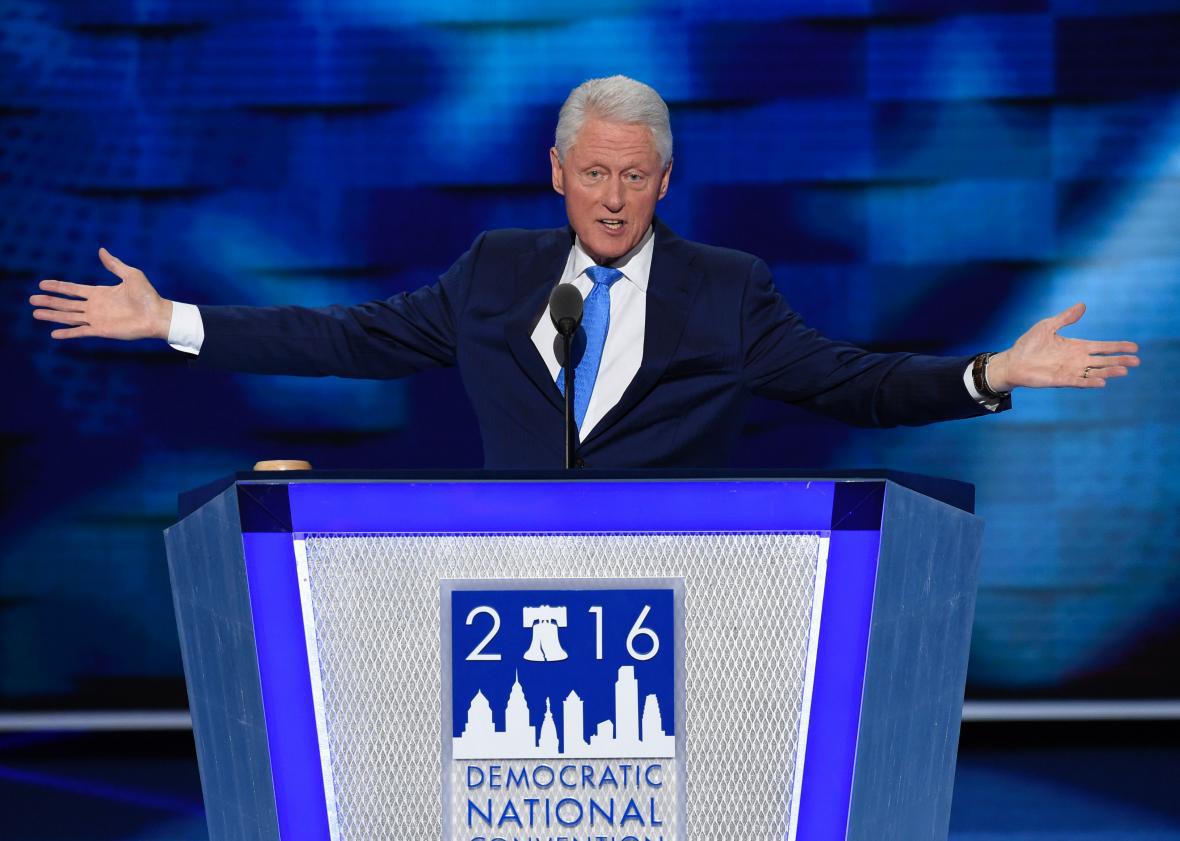PHILADELPHIA—No one doubts Hillary Clinton’s competence. Even in polls where majorities say they distrust her and dislike her, Clinton wins resounding marks on her ability to be president. It’s not in question. Where Hillary struggles is in the more elusive qualities. Voters don’t trust her. She doesn’t seem approachable. Or relatable. Or honest.
If the first night of the Democratic National Convention was designed to build up party unity and defuse the tension of the primary, the second night was devoted to dealing with this problem—humanizing Hillary Clinton. And so, viewers were treated to a march of stories and testimonials.
Up first were the “Mothers of the Movement,” black women who had lost sons and daughters to police or vigilante violence. They testified to the lives and legacies of their children, and attested to Hillary Clinton as a woman who cared, who spoke to them, who treated them with respect and dignity, who represented their interests as citizens. There’s wide room to contest Clinton’s record on criminal justice, but as stagecraft, this was effective.
What followed were words from 9/11 first responders, who like the mothers, testified to Clinton’s loyalty and kindness, the extent to which—in their eyes—she was trustworthy.
I’m sure you can see the pattern building. Each speaker or set of speakers was placed for this purpose, to reintroduce Hillary Clinton to the public—not as a hypercompetent diplomat or a steely-eyed legislator, or indefatigable presidential candidate, but as a relatable, good-hearted, and fundamentally decent woman. All of it culminated in Bill Clinton.
His was the last address of the night, and it was the one most clearly devoted to painting a different portrait of Clinton. And who is Hillary, according to Bill?
Hillary is the girl across the room, whom he pursued until she agreed to marry him. She’s the woman who pushed and encouraged him as he made a career in politics. She’s the devoted mother who gave her all to raise their daughter. She’s the “change maker” who worked behind the scenes to improve life for the marginalized and disadvantaged. She’s his best friend and an invaluable partner in life. “I just went ahead and asked her to take a walk down to the art museum,” he said, describing their first date. “We’ve been walking, talking, and laughing together ever since. And we’ve done it in good times and bad, through joy and heartbreak.”
As Bill sped toward the conclusion of his speech—both a loving tribute to and brief for his wife—he posed a question to the audience, and the American public writ large. “If you win elections on the theory that government is always bad and will mess up a two-car parade, a real change maker represents a real threat,“ Clinton said. ”Your only option is to create a cartoon alternative, then run against the cartoons. Cartoons are two-dimensional and are easy to absorb. Real life is complex and hard to absorb.”
It’s a simple argument. If Hillary seems bad, it’s because her opponents have demonized her, crafting a caricature that doesn’t represent the actual Hillary. But Bill wants to do more than dispel the caricature. He wants you, the viewer, to understand that he loves Hillary Clinton, that she’s a genuine person, that she’s the most important part of his life, and that he’s willing to give this intimate, personal, and awkward speech if it means you’ll see her like he does.
Whether or not you believe Clinton—whether or not you buy this piece of political mythmaking—what’s striking is the degree to which it was simultaneously mundane and momentous. Structurally, Clinton gave the classic speech of a political spouse. He sounded more like Ann Romney than, well, Bill Clinton. And it was made doubly unusual by the fact that Hillary Clinton is among the most famous women in the world. Americans both know her and find her impenetrable.
At the same time, this is a former president (and a man) speaking on behalf of his wife, in a speech that emphasizes Hillary’s womanhood. It’s a speech in which Clinton—speaking about Hillary’s pregnancy—casually referred to the moment her water broke.
The political question, as always, is whether this moves the needle. If not for Donald Trump, Hillary Clinton would be the most unpopular major party nominee in modern history. And part of that is distrust, fueled both by her actions and the swirl of attacks and innuendo that surround Hillary, and have surrounded her for years.
If Bill Clinton still has the old magic, if he can still captivate an audience and bring them along, then Hillary is fine. But there’s a chance the dislike and distrust is too deep-seated, and that nothing—not even a love story from the former president of the United States—will change that.
